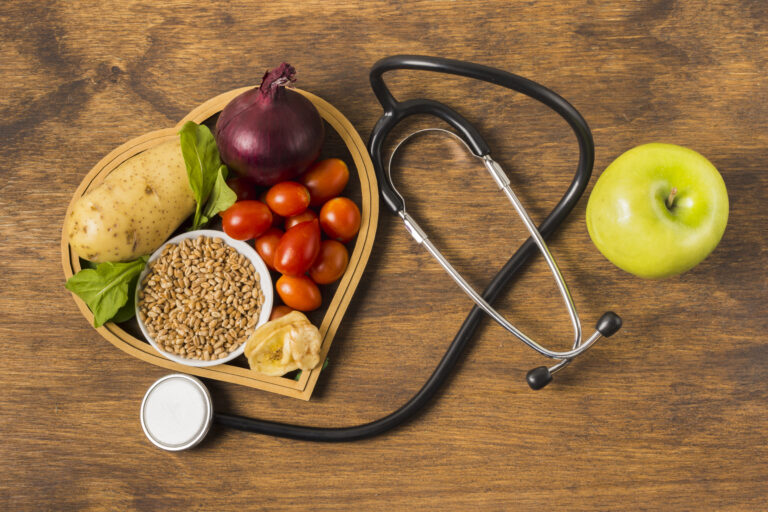
Heart disease continues to be a leading cause of death globally—and cholesterol plays a major role in that risk. While cholesterol is a vital substance in the body, too much of the wrong kind can quietly pave the way toward clogged arteries, heart attacks, or strokes.
The good news? You can manage your cholesterol effectively. The first steps involve understanding the causes of high cholesterol, choosing foods that lower cholesterol, and following a cholesterol lowering diet recommended by healthcare professionals.
Key Takeaways
- Having high cholesterol can raise your chances of getting heart disease or having a stroke.
- Foods that lower cholesterol can significantly improve heart health.
- A cholesterol lowering diet, combined with exercise and medications, offers optimal results.
- Identifying the causes of high cholesterol helps in prevention and long-term management.
5. Regular cholesterol screenings are essential, even if you feel healthy.
Table of Contents
1. What Is Cholesterol?
Cholesterol is a fat-like substance in your body that helps make hormones, vitamin D, and the juices needed to digest food. However, too much cholesterol in your bloodstream—especially low-density lipoprotein (LDL)—can cause health problems.
Types of Cholesterol:
- LDL (Low-Density Lipoprotein): Known as “bad cholesterol,” it builds up plaque in arteries.
- HDL (High-Density Lipoprotein): HDL is known as “good” cholesterol because it helps remove the “bad” cholesterol from your blood.
- Triglycerides: A type of fat that, when elevated, also increases heart disease risk.
2. Why Cholesterol Matters
Excess cholesterol, particularly LDL, can lead to the hardening and narrowing of arteries—a condition called atherosclerosis. This reduces blood flow to the heart and brain, potentially
- Heart attacks
- Strokes
- Peripheral artery disease
Lowering your cholesterol can reduce your risk of these life-threatening conditions and improve overall cardiovascular health.
3. Understanding the Causes of High Cholesterol
Knowing the causes of high cholesterol can help you make smarter lifestyle decisions and reduce your risk early on.
Primary Causes of High Cholesterol:
- Poor Diet
Consuming too much saturated fat (found in red meat, dairy, fried foods) or trans fats (processed snacks) can raise LDL levels.
- Lack of Exercise
A sedentary lifestyle reduces HDL (good cholesterol) and contributes to weight gain.
- Obesity
Being overweight, especially with belly fat, increases LDL and triglycerides.
- Genetics
Familial hypercholesterolemia is a hereditary condition causing high LDL levels even in young people.
- Smoking
Smoking damages blood vessels and lowers HDL cholesterol.
- Medical Conditions
Diabetes, hypothyroidism, and kidney disease can all influence cholesterol levels.
- Age and Gender
As people age, cholesterol levels naturally rise. Post-menopausal women may also see an increase in LDL.
4. Foods That Lower Cholesterol Naturally
Diet has a powerful influence on your cholesterol. Eating the right foods that lower cholesterol can improve your lipid profile and reduce the need for medication.
Best Foods That Lower Cholesterol:
- Soluble Fiber-Rich Foods
- Oats, barley, lentils, and fruits (like apples and pears)
- Soluble fiber binds cholesterol in the digestive system and helps remove it.
- Nuts and Seeds
- Almonds, walnuts, chia seeds, flaxseeds
- High in omega-3s and unsaturated fats that support HDL levels.
- Healthy Fats
- Avocados, olive oil, fatty fish (salmon, sardines)
- Replace saturated fats with heart-friendly unsaturated fats.
- Plant-Based Proteins
- Beans, soy products, tofu, peas
- Replace red meats to reduce LDL cholesterol.
- Green Tea
- Contains antioxidants called catechins that help lower LDL.
- Garlic
- It can help lower cholesterol a little and make your heart work better.
5. Cholesterol Lowering Diet: What to Eat and Avoid
A structured cholesterol lowering diet includes not only what you add—but also what you reduce or eliminate.
What to Include:
- High-fiber foods (vegetables, legumes, fruits)
- Whole grains (brown rice, oats, quinoa)
- Omega-3 fatty acids (salmon, chia seeds)
- Unsalted nuts and seeds
- Green leafy vegetables
- Plant sterols and stanols (available in fortified foods)
What to Avoid:
- Fried and fast foods
- Full-fat dairy products (cream, butter, cheese)
- Red meats and processed meats
- Baked goods made with hydrogenated oils
- Sugary drinks and desserts
- Coconut oil and palm oil (high in saturated fat)
Maintaining portion control, drinking plenty of water, and reducing salt intake also support heart health.
6. Lifestyle Tips for Better Cholesterol Management
Diet is just one piece of the puzzle. Pairing nutrition with healthy habits is key to successful cholesterol management.
- Get Moving
- Aim for 150 minutes of moderate activity per week.
- Exercises like walking, swimming, biking, and yoga are great for staying healthy.
- Manage Stress
- Chronic stress increases cortisol, which may raise LDL levels.
- Do things like deep breathing, meditation, or fun hobbies to help you feel calm and relaxed.
- Quit Smoking
- Stopping tobacco use boosts HDL cholesterol and reduces heart disease risk significantly.
- Maintain Healthy Weight
- Losing even 5–10% of your body weight can have a significant impact on cholesterol levels.
- Sleep Well
- Aim for 7–8 hours of sleep per night. Poor sleep can disrupt lipid metabolism.
7. Medical Treatments and Cholesterol Medications
Sometimes lifestyle changes alone aren’t enough. Doctors may prescribe cholesterol medications to lower the risk of heart attacks or strokes.
Common Cholesterol Medications:
- Statins
- The most widely used drugs to lower LDL.
- Examples: Atorvastatin, Rosuvastatin, Simvastatin
- Ezetimibe
- It blocks your body from absorbing cholesterol from the food you eat in your gut.
- PCSK9 Inhibitors
- Injectable drugs for people with very high cholesterol or genetic conditions.
- Bile Acid Sequestrants
- Bind to bile in the intestine and help remove LDL from the body.
Note: Medication should always be taken under medical supervision, with regular blood tests to monitor liver function and cholesterol levels.
8. Monitoring Your Cholesterol Levels
Getting regular tests is important, even if you feel completely fine.
Recommended Blood Tests:
- Total cholesterol
- LDL (bad) cholesterol
- HDL (good) cholesterol
- Triglycerides
How Often to Test:
- Every 4–6 years for adults aged 20+ with no risk factors
- Annually or more frequently for those with high cholesterol or other heart disease risks
- Your doctor will create a personalized plan depending on your age, family history, and health condition.
9. Risks of Untreated High Cholesterol
If high cholesterol is not addressed in time, it can silently lead to serious and irreversible complications.
Common Risks:
- Coronary artery disease
- Heart attack
- Stroke
- Peripheral artery disease
- High blood pressure
- Kidney disease
- Liver damage (non-alcoholic fatty liver disease)
10. When to See a Doctor
You should consult a doctor if you:
- If your parents or close family members have had heart disease or high cholesterol, you may be at risk too.
- Are overweight or obese
- Experience chest pain, shortness of breath, or fatigue
- Are above 40 years old and haven’t had a recent cholesterol check
- Are diabetic or hypertensive
At Pentagon hospital, we provide comprehensive cholesterol management programs, combining lab diagnostics, cardiology consultation, diet planning, and medication support.
Final Thoughts
Managing cholesterol isn’t about strict diets or taking pills forever—it’s about balance, awareness, and commitment to long-term health. Knowing the causes of high cholesterol, adopting foods that lower cholesterol, and following a cholesterol lowering diet are vital steps in preventing heart disease and improving overall wellness.
Start with small changes. Talk to your doctor. Get tested. And most importantly, take control of your heart health today.
Take Charge of Your Health with Pentagon Hospital’s Expert Medical Team
Whether you’re managing chronic conditions like high cholesterol or seeking preventive care, the experienced internal medicine specialists at Pentagon Multispecialty Hospital are here to support you.
Book your consultation today and take the first step toward a healthier, balanced life.
FAQs
Can high cholesterol be reversed naturally?
Yes, in many cases, lifestyle changes like diet, exercise, and weight loss can reduce cholesterol significantly—sometimes eliminating the need for medications.
Are eggs bad for cholesterol?
Eggs contain a good amount of cholesterol, but they’re low in bad fats, so they can still be part of a healthy diet. In moderation (1 egg/day), they’re generally safe for healthy individuals.
How long does take to lower cholesterol?
With a consistent cholesterol lowering diet and lifestyle, improvements may be seen in 6–12 weeks.
Are cholesterol medications lifelong?
Not always.If healthy habits keep your cholesterol in a good range, your doctor might lower your medicine dose or even stop it—but only with careful monitoring.
What is the ideal cholesterol level?
Total cholesterol: Below 200 mg/dL
LDL: Below 100 mg/dL
HDL: Above 60 mg/dL
Triglycerides: Below 150 mg/dL
We look forward to assisting you with your healthcare needs.
Just Make an Appointment
and You’re Done!


